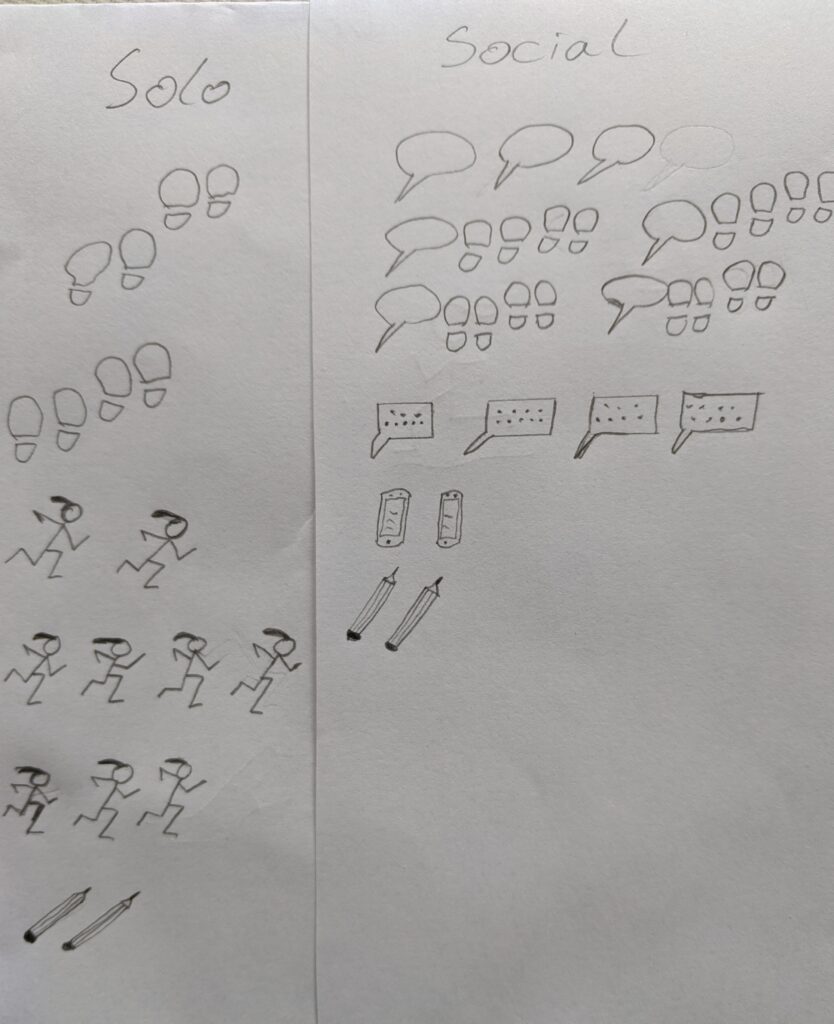Creating Data
For this week, we were asked to create our own data based on activities that we undertake connected to our learning, but in an analogue way. The ‘Dear Data’ project (Lupi & Posavec 2015) was an introduction to this and I really like the idea of this project and the way these two talented women have been sending each other postcards with personal data to get to know each other. Doing something like this myself was a bit anxiety provoking for me, since I have trouble drawing even the simplest of things. Thankfully one of my kids is very good at art and she took the time to help me draw my analogue data; I want to give her the credit she deserves!
I have chosen to look at wat I have termed my reflective learning; learning that takes place in less formal learning spaces, which I looked at briefly in the week about spaces as well. My formal learning takes place whilst I am sitting at our dining room table reading, writing and watching the occasional video, but my reflective learning mostly takes place elsewhere. Keeping tabs on both types of this learning this week, I found that I spend more time reflecting than I do reading and writing, which I found surprising. The data in the figure is purely data on my reflective learning though; see the figure below.

I have split the reflective time up in two sections; one for reflections I do by myself (solo) and the other in a more social setting, with at least one other person. I hope the pictures speak for themselves, but just for clarity; the footprints indicate walking, the little person running and the pencil stands for drawing. On the social side, the speech bubble indicates talking to someone; this can be colleagues, family or friends, the speech bubble with the walking shoes means a walk and talk with someone, the rectangular speech marks note the time I spent on the forum and the phone indicates a phone call or using WhatsApp to communicate with other students. Each picture symbolises a 15 minute timeframe, since that was the shortest time I spend doing any one thing. It is hard to be precise with the timings of these activities though; most of them will be a mix of reflection on my learning and other thoughts or conversations. Particularly with a topic like big data though, there is a lot going on that is relevant, so I do find myself thinking and talking about it often, which was interesting to notice once I started keeping track of it.
I thought about showing the activities in chronological order, but I did think the divide between solo and social learning was more interesting than a time line approach which would have shown more studying time on days that I don’t work but no real surprises. There is half an hour more social learning than there is solo learning in this week which was unexpected, but I think this is partly due to my interest and the relevance of the topic currently; Big Data seems to be on people’s minds at the moment.
Even though I tracked my own data, in an analogue way, it still feels like I am ‘activity tracking’ (Wilson et al. 2017). I have tracked what I do to reflect, with who and for how long, but looking at the data at the end of the week, it does track my activities and not necessarily my learning. This has made me wonder if data in education is really that useful. Testing knowledge in students using a multiple choice quiz or similar would provide a useful, if very time specific, data set. For more complex learning, where it isn’t possible or practical to use multiple choice or other straightforward tests, I am unsure if learning analytics are really necessary or desirable.
Lupi, G. & Posavec, S. 2015. Dear Data – Opening Keynote, Eyeo Festival.
Wilson, A., Watson, C., Thompson, T.L., Drew, V., & Doyle, S. 2017. Learning analytics: challenges and limitations. Teaching in Higher Education. 22(8). pp. 991-1007




Interesting stuff. The visualisation of the data works well although the boundaries seem fuzzy to me – what if you engage in a moment of reflection in or on-action while in a formal study space? How do you deal, if at all, with distractions, eg on your walks or runs which would be more obvious in your formal study space? Also, how did you distinguish between reflections and learning – is learning possible without reflection? Do you think it may have ben useful to count outputs of your reflections, eg, number of questions identified, new thoughts written down etc….? But regardless of these queries, your central argument around whether it is possible to datafy learning is an important one. Should learning analytics be more explicitly use tests of knowledge and understanding? Interestingly, for on-campus courses at Moray House, more time is allocated to the marking of assessments than to direct class contact time (the workload model doesn’t really work for online teaching so I’m not sure if that is really the case or not for this programme).